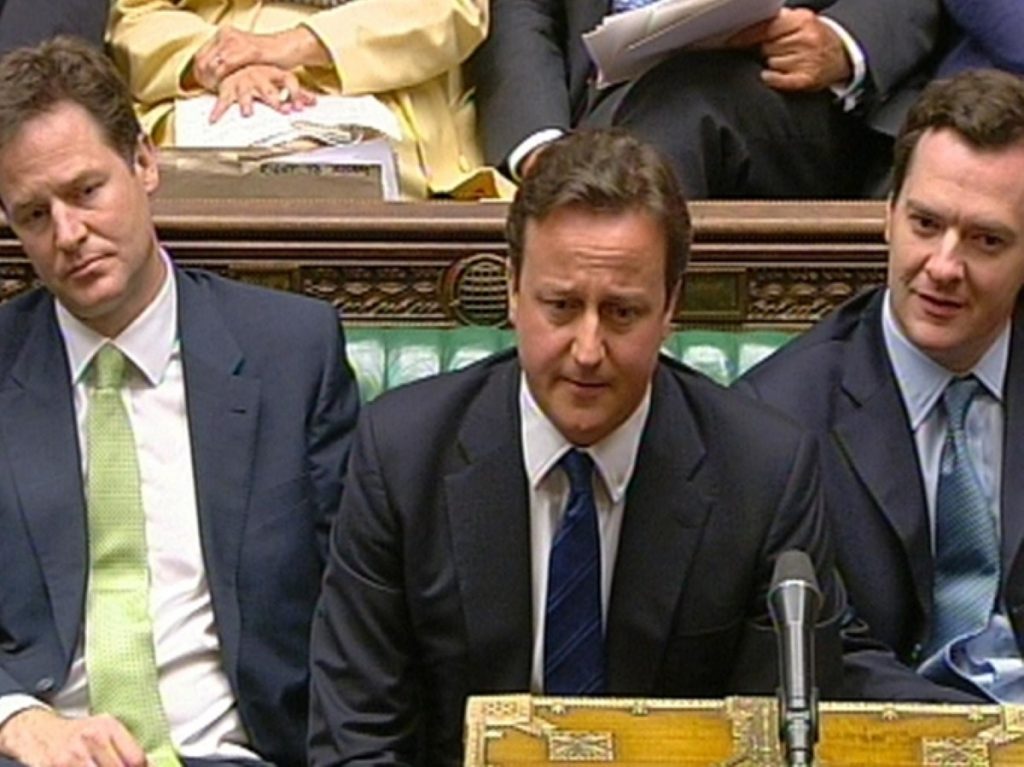PMQs sketch: Lib Dem bashing unites Cameron and Miliband
Whether he meant to or not doesn’t matter: David Cameron’s comments did more damage to the Liberal Democrats than Labour.
The prime minister can take away an important lesson from this week’s exchanges. It’s much harder to beat the opposition when every step you take seems designed to do down your coalition partners.
The Conservatives have trouble with a few of their backbenchers over tomorrow’s tuition fees vote. But their woes are nothing compared to the agonies of the Liberal Democrats, who will break a pre-election pledge to oppose any hike in fees if they back their ministers. For much of this lunchtime’s session backbench Lib Dems listened in their usual grumpy, stolid, uncomfortable silence at the jeers of the opposition. The perhaps unintentional jeers of the prime minister probably didn’t help, either.


“In the end we have to make a choice,” Cameron said, after Ed Miliband quickly raised the issue. Labour’s heckling was rough, abrasive, almost cackling in its tone. Cameron didn’t take the hint to steer clear of trouble. Instead, apparently utterly unaware of how controversial he was about to be, he added: “One party has had the courage of its convictions to see this through.”
Lib Dem MPs should have been gripping each other’s arms in horror. This was a direct insult. It was the parliamentary equivalent of being slapped around the face with a wet fish. Cameron certainly wasn’t referring to Labour. So he must have been referring to the Tories! Sacrilege! One Lib Dem, Stephen Williams, responded by engaging in a shouting match with a Labour MP opposite. His colleagues just looked more and more miserable, just sitting there disbelievingly. They are spending the week plumbing the depths of political misery, so they are presumably numbed to any kind of insult now.
Miliband’s work was being done for him. He may as well have packed up and gone home, for his frothy scoffing was as nothing compared to the slurs pouring out of Cameron’s mouth. “They’re split four ways – that’s something even for the Lib Dems,” Miliband burbled lightly. Surely the prime minister could do better than that at bashing the Lib Dems? Of course he could. “Why are they breaking the pledge about the Browne review?” he asked. This time he was talking about Labour. But the mere mention of the word ‘pledge’ was enough to set opposition backbenchers off. They shouted and yelled their derision so much that Speaker John Bercow was forced to intervene. Even he couldn’t help but comment on the problems. “All this finger-pointing is very unseemly,” he observed. Of course he was talking about Labour’s MPs, and not Cameron at all. Wasn’t he?
Having got off to this rather poor start, Cameron attempted to rescue the situation by launching some thoroughly tepid assaults on Labour’s position. “We were left with a completely unsustainable situation” is, let’s face it, just plain boring. He needed to jazz things up a bit. “Under the new system,” the PM tried ingratiatingly, “everyone will pay back less than they do under the current system.” Really? Then why are students so angry? “They will pay back less every month,” he added. Those two extra words make quite a difference to the meaning. Miliband was rightly scornful. “Only the prime minister would treble tuition fees and then claim it’s a better deal for students,” he scoffed.
Recent weeks have seen Labour’s new leader gradually being eclipsed in PMQs, adding to the huge pressures on his young leadership. After Cameron accused Miliband of “complete political opportunism” and being nothing more than a “student politician”, much of this pressure suddenly disappeared. “I was a student politican,” Miliband replied slowly, exhibiting all the sluggish Eeyoreness which has resulted in him being so roundly mocked by all sides. But then, out of nowhere, came his killer blow. At least he spent his student days, he explained, “not throwing bread rolls and wrecking restaurants”. David ‘Bullingdon Club disgrace’ Cameron looked abashed. He was as sheepish as only a sheep could be if 300-odd shepherds were waving their crooks in the air and pointing at him as they cheered mockingly.
For shepherds, you may have guessed, just insert Labour MPs. It was a rousing moment – the sort of adulation politicians like to bottle up and save for a rainy day. When Cameron wrapped up with a closing flourish about Labour not being a party of government, by contrast, his MPs barely registered it.
The best question of the session, by a mile, came from the Democratic Unionist party’s Nigel Dodds. He appeared to be asking about Fifa’s decision to reject England’s World Cup bid, moaning about an organisation which “says one thing and does another” and “a leader more interested in power and prestige than accountability”. Everyone knew he was really talking about Clegg, who slumped in his seat, looking beaten. “When it comes to breaking promises, politicians have got nothing on football management,” the prime minister said vaguely. No-one really knew what to make of that, but the prime minister was by now all over the place. He finished with an extravagant flourish, calling Labour an “organised hypocrisy”. Once again, it was painfully easy for Labour to point at the Lib Dems.
Earlier, Labour backbencher Kerry McCarthy reminded Cameron that Johnny Marr and Morrissey had banned Cameron from liking them. Cameron, in an attempt at good humour, doubted whether This Charming Man would fit the bill. Nick Clegg’s face initially remained unmoved. He spends much of his time sitting next to the prime minister developing one of his natural talents – trying to look as anonymous as possible. Eventually, the thoughtful stare broke. He couldn’t help but smile wearily. At least this was a joke which wasn’t aimed in his direction.












